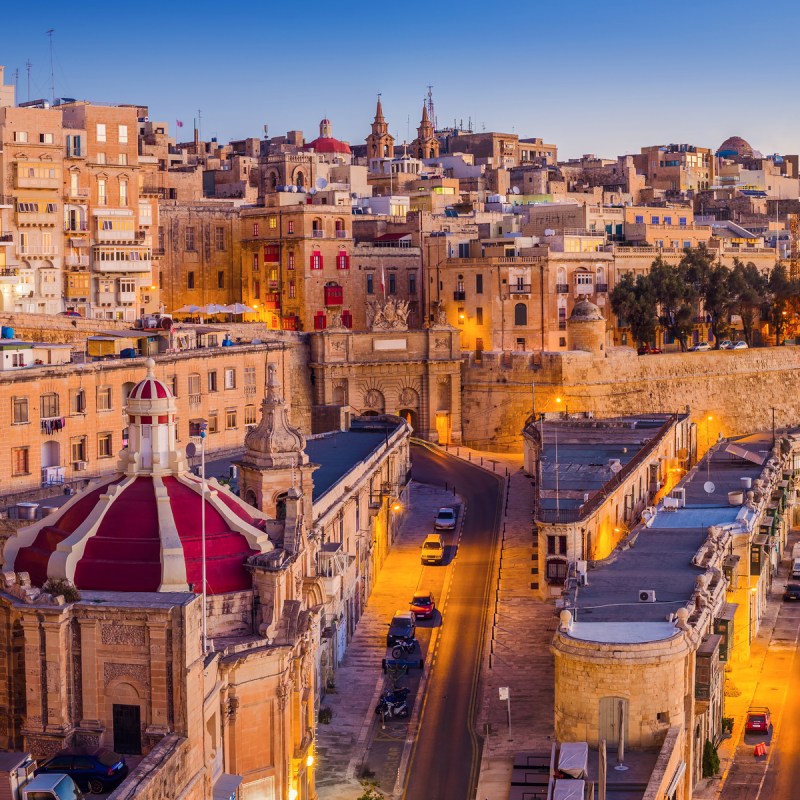
Many of us don’t know much about the tiny island nation of Malta. Sure, we might have heard of its rugged Mediterranean coastlines, rich history, and stunning culture in passing. But beyond that, it seems a faraway place, a footnote in an encyclopedia or travel guide.
Videos by TravelAwaits
That’s why you might be surprised to hear that Malta’s quite the destination when it comes to expat retirees. Folks from around the world have flocked there post-career to reap the many rewards of living on this charming, colorful island.
Here are eight reasons why Malta is a top spot when it comes to international retirement locations.

1. The Healthcare System
Despite its tiny size, Malta is widely known for having some of the best healthcare in the world, consistently ranked well among all countries for overall healthcare services. And when you consider the first hospital on the island opened in 1372, and that the famed Knights of St. John quickly started expanding healthcare here in the 16th century, Malta’s commitment to healthcare isn’t surprising.
Residents here can choose between the free public system, funded by taxpayers, which offers many services, including specialist treatment, hospitalization, diagnostics, and prescriptions. Mater Dei is the largest public hospital, with other clinic sites scattered across the island. But wait times can be long to access free care, so citizens can also opt for private care which they pay for with insurance, which gives them access to two private hospitals, and a number of satellite locations on Malta.
EU citizens are covered with their European Health Insurance Card. Non-EU expats who want to take part in the public system must pay into social security, or purchase private insurance. You’ll want to do thorough research well before your arrival to figure out what sort of coverage you’ll need.

2. Cost of Living
Compared to other big-city European and American locales, Malta can be a bit of a bargain, depending on where on the island you choose to live. Of course, while the seaside is gorgeous, you’re also going to pay the premium for those breathtaking views. Consider a shift off the coast to bring your costs down.
“If you want to find cheaper places to live, you must go inland to villages away from the business and commercial districts,” advises Mark Christian, an Oklahoma City-based oil and gas executive who used Malta as an administrative and procurement base for his family business for 30 years.
Another thing to keep in mind: being an island nation, Malta relies heavily on imports — including foodstuffs — and most of it comes from nearby Italy. However, you can keep food costs down with frequent visits to Malta’s farmers’ markets. Another plus: you’ll get the freshest, most seasonal food possible!
One more thing to keep in mind for your budget: You’ll pay extremely inflated prices for designer or American label clothes. Plan to bring those with you when you make your move, as opposed to buying once you arrive.

3. The Perfect Climate
Balmy and mild, Malta’s climate is a huge draw for expat retirees. Delightfully Mediterranean, the island typically has warm, sunny summers and a brief rainy season.
“The rainy season lasts from November through February,” says Christian. “The rest of the year is sunny with only about 1-2 days worth of precipitation per month if that.”
And, given its southern location, you’ll enjoy more sun each day than in nearly any other place in Europe… on average, twice as much annually as in London! This makes it the perfect place for long strolls on the beach, exploring, and enjoying island life.

4. The Stunning Natural Beauty
Malta is one of the most stunning places we’ve been lucky enough to visit. Of course, its world-renowned seascapes are absolutely incredible… but then there are also the cliffs, caves, lush meadows, and even desert-like landscapes, all on this special, small island.
Also, keep in mind — if you’re a snorkeler or diver, the natural wonders extend to the underwater world as well. You’ll spot incredible geological formations, as well as several species of tropical fish.
And while they are gorgeous, be aware, the vast majority of beaches on Malta aren’t the sugar-sand variety you might associate with other tourist hot spots.
“The beaches are rocky,” advises Christian. “Sand has been imported from Libya to make a few sandy beaches for the tourists, but don’t expect Caribbean-style beaches because there are none.”

5. The Different Cultures
More so than many other places on earth, Malta is truly a melting pot with a fascinating history… and it’s been greatly influenced by the many people who have settled here over thousands of years. All those traditions and beliefs have all combined to create a culture all its own, unique to Malta.
“The island has been conquered by just about every major empire of the past 70 centuries; that is what makes Malta so interesting,” says Christian. “The island has been ruled by the Phoenicians, Carthaginians, Romans, Greeks, Arabs, Normans, and British, and each of those cultures left a social, religious, and political mark on the Maltese people. The remnants of past rulers can be found in Malta’s traditions, religion, and food.”
History buffs will love exploring the island’s many important sites, including its three UNESCO World Heritage Sites: the entire city of Valletta, its megalithic temples, and the mysterious Ħal Saflieni Hypogeum, an underground sanctuary, and mausoleum, which archeologists say dates back to 3000 B.C.
Another fantastic way for retired expats to get to know their new home is by exploring all of the small villages scattered across the island. Malta is heavily Catholic, and each village has its own religious festival and feast day each year, celebrating a specific patron saint.
“Every village has a church and festivities begin there,” explains Christian. “It is a street party with food, drinks, fireworks, and lots of people enjoying each other — think of an Anthony Bourdain episode.”
Add outdoor concerts and other events — all with their own feel and flair to this mix — and it’s not hard to understand why Malta’s deep, rich culture is a huge draw for retirees!

6. The Incredible Cuisine
As you might expect, it’s not difficult to maintain a healthy Mediterranean diet on Malta. The food here is hearty, rustic, and delicious!
Traditional dishes lean heavily on the abundant fish harvested daily from the sea, including aljotta, a Maltese fish stew, and lampuki (fish) pie. Hobz biz-zejt — or bread topped with olive oil, cheese, and fresh tomatoes — is a favorite of the locals, and with its close proximity to Italy, it should be no surprise that cafes and restaurants also serve up delectable pasta. You’ll also see fenek — or rabbit — on many menus.
The dessert here is also divine, with gelatos, semifreddos, and date and nut cakes all on offer. They are often sold from street carts in Malta’s larger cities… and make a great snack while exploring or on the go.
In short, the blending of so many cultures here lends Malta a culinary distinction all its own — one you (and your stomach) are bound to love!

7. The Leisurely Mediterranean Vibe
We’ve all heard of “island time.” Well, that general laid-back no-rush, no-fuss vibe is also experienced on Malta. The pace is slower than in larger population centers, with a focus on history, culture, and connection with others. It’s the perfect place to slow down, explore and pass the time. Another plus: if you decide to retire here, you’re going to run into a diverse group of expats from across the globe, making for a rich experience as you develop your own community of friends.
“There are a lot of retirees from the UK living in Malta,” said Christian. “I also met retirees from Scandinavia and Germany. I think one of the main reasons they enjoy Malta is due to the mostly sunny weather, and slow simple Mediterranean life.”
8. Safety
Last but certainly not least, Malta serves as a safe, peaceful haven for those who live on the island. Violent crime is quite rare when compared to the United States and many other parts of the world.
That said, you’ll want to keep your common sense about you when you’re out and about, and don’t leave your street smarts at home in the U.S! Stay alert, aware of your surroundings, and observant, especially when using an ATM or in areas popular with tourists. Petty crime and theft can and do happen on Malta, but keeping an alert eye out can go a long way in making sure you don’t fall victim to thieves or scammers.
What’s more, Malta is consistently ranked as one of the least susceptible countries in the world to natural disasters, taking into account extreme weather events and disaster management. It’s yet another fact that might put an expat’s mind at ease when it comes to living in the island nation!
Find out more about retiring in Malta here and see all of TravelAwaits information on retirement here:
